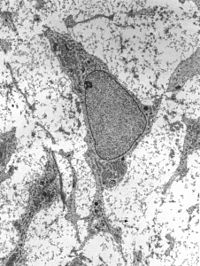
Photo from wikipedia
Large B-cell lymphoma of immune privileged sites (LBCL-IP) arise in immune sanctuaries including the testis and central nervous system. After initially reaching complete response, relapses occur in almost 50% of… Click to show full abstract
Large B-cell lymphoma of immune privileged sites (LBCL-IP) arise in immune sanctuaries including the testis and central nervous system. After initially reaching complete response, relapses occur in almost 50% of patients, typically at other immune privileged sites. Resolution of the clonal relationships and evolutionary patterns of LBCL-IP is required to understand the unique clinical behavior. We collected a unique set of 33 primary-relapse LBCL-IP sample pairs and performed next-generation sequencing for copy number, mutation, translocation and immunoglobulin clonality analysis. All LBCL-IP sample pairs were clonally related, and both tumors developed from a common progenitor cell (CPC) with MYD88 and TBL1XR1 mutations and/or BCL6 translocations in 30/33 cases, indicating that these are early genetic events. This was succeeded by intermediate genetic events including shared, as well as unique alterations in targets of aberrant somatic hypermutation (aSHM), CD79B mutations and 9p21.3/CDKN2A loss. Genetic alterations in genes involved in immune escape (HLA, CD274/PDL1LG2) were predominantly unique in primary and relapse samples and thus considered late genetic events. Together, this study indicates that primary and relapsed LBCL-IP follow an early parallel evolutionary pattern where the CPC contains genetic alterations that support prolonged survival/proliferation and retention in a memory B-cell state, followed by germinal center re-entry, aSHM and immune escape.
Journal Title: Cancer research
Year Published: 2023
Link to full text (if available)
Share on Social Media: Sign Up to like & get
recommendations!